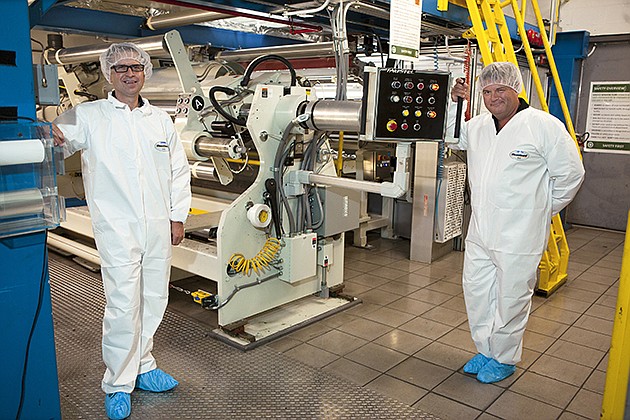- November 25, 2024
-
-
Loading

Loading

There's one thing in common between the windows around the ice at the Tampa Bay Times Forum, the Hancock building in Boston, Safeco Plaza in Seattle, the United Food Bank and a number of U.S. Embassies around the world. All tout Madico window films.
A window film can be used for anything from sun and weather protection to safety. That's what keeps the company's 90,000-square-foot manufacturing facility on 6.6 acres in St. Petersburg working around the clock.
The facility, co-run by Senior Vice Presidents Jeffrey Plummer and Shawn Kitchell, is the headquarters of Madico Window Films, a division of Woburn, Mass.-based Madico Inc.
Although executives declined to share exact figures, the window film division's annual sales are between $50 million and $100 million, with 62% of sales to more than 70 countries outside the U.S.
The plant has been manufacturing window films for the last 39 years through a number of ownership changes. Madico bought it in 2010. Since the acquisition, the company has added 50 new employees. Currently 100 people work out of the St. Petersburg plant, with 40 others in sales positioned in seven distribution centers across the country.
“Right now every part of the world is lit up,” says Plummer, who heads up sales and marketing. Over the last couple years the division has seen double-digit growth that doesn't seem to be slowing down, he adds. “The factory is full. We're running around the clock, and we're having to decide what products we're going to need our other factories to fill in because we're in our peak season.”
The company is focused on three main segments: solar control, security and automotive window films for cars, boats and trucks. Automotive sales are about 55% of the business, with Asia the fastest-growing region in the world. Safety and security sales make up roughly 20% of the business, which is above the industry average for window films manufacturers. In this segment, Madico contracts with the U.S. government for a hardening product on windows that protects from bomb blasts.
In the last three years, the company has invested $3 million in facility upgrades and making a clean-room environment. It has upgraded the measuring equipment, sensing equipment and scanning systems for defects and measuring color and coat weight thickness, according to Kitchell. The company has also purchased temperature-controlled bulk storage tanks, high-speed mixing equipment and analytical equipment for the research and development lab to constantly improve quality.
Kitchell says it has also invested a lot of money in training employees in Six Sigma lean methodologies.
“Six Sigma is all about reducing variation,” he says.
With thousands of different products, it is important to optimize standard work practices and reduce variation in processes as much as possible.
A commitment to consistency in quality is essential to compete against huge companies such as 3M, Saint-Gobain and Eastman. But as a smaller company, Madico Window Films is more nimble, with the ability to come up with a more customized solution that packages the engineering and testing, Plummer says.
The bigger challenge is “there are a lot of low-cost offshore products coming,” Plummer says, in that if you don't know window films, you won't be able to tell the difference in quality from just looking at them.
The only thing to keep them ahead is to continue to innovate, Plummer says.
“In our funny little window film industry, we're putting out these different products as well,” he says.
The company recently released the Solution Series, which includes anti-fog window film for refrigerators in grocery stores and films that make glass invisible for insects, so bugs don't congregate by the windows and doors of a 7-Eleven.
The company has also adopted a new “can-do” attitude, with matching arm bands that say “Yes I can.” Plummer says the new attitude is all about providing excellent service to internal and external customers.
“If you are asked to get a shipment out the door, don't start with worrying about the logistics. Start with, 'We're going to do it; now we're going to figure out how we're going to do it,'” he says.